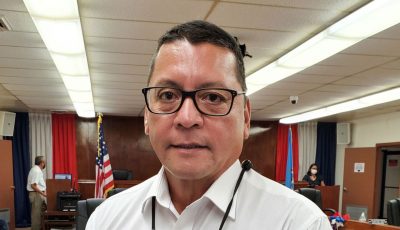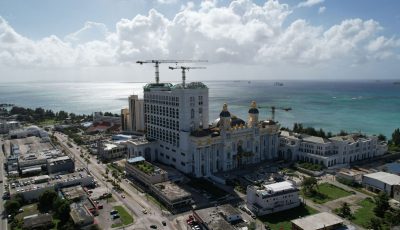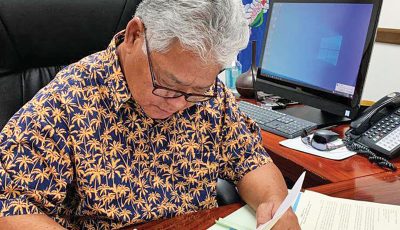WITH CASINO STILL UP IN THE AIR
Focus may shift to video lottery and e-gaming
With the future of a Saipan casino hanging in the balance over lawsuits and a host of concerns, Gov. Eloy S. Inos hinted at refocusing on two other major revenue-generating industries allowed by law: electronic gaming and video lottery. And while much focus was devoted to e-gaming and casino the past months, investor groups from Canada and Taiwan are ready to come in and operate video lottery terminals, he said.
Moreover, while the governor has expressed openness to putting the casino question on the ballot, he said this could further delay the restoration of retirees’ deferred 25 percent pension and payment of contribution interest for former defined benefit plan members, among other relief.
Inos is also hoping that candidates won’t use the casino issue for their political campaign.
“The problem is, they’re thinking I’m using it for political [purposes]…” he said. Inos said others just want to derail the casino project and are “politically motivated.”
Inos said it’s unfortunate that the Saipan casino is under litigation. However, he said his administration respects the judicial process.
“But that should not deter us from continuing to look for ways to generate more revenue. If it means bringing casino before the people, so be it. The thing is, the more we delay, the greater the burden will be,” he said, referring to, among other things, restoring pension cut.
He reiterated that in his view, Saipan casino is not a question of “when” but “if.”
Because of ongoing court litigation, the Lottery Commission is stopped from deciding whether to reject or approve a license for the exclusive development of a minimum $2 billion integrated casino resort on Saipan.
Marianas Stars Entertainment Inc. and Best Sunshine International Ltd. are vying for the exclusive license.
Inos said he’s glad that the first electronic gaming facility on Saipan—Club C at Kanoa Resort—opened smoothly last week. Portions of government revenue from e-gaming will also go to pension cut restoration, although Inos said this is not enough to cover the entire obligation.
Rep. Tony Sablan (Ind-Saipan), author of the electronic gaming bill that became law in December 2013, said besides Marianas Resort & Spa in Marpi, at least three other hotels are considering setting up e-gaming in their facilities.
“There’s at least three others but nothing is final yet—Fiesta Resort, Laolao Bay Golf & Resort, and Hafadai Beach Hotel. There may be more,” Sablan said on Capital Hill.
Sablan, chairman of the House Ways and Means Committee, said he is also pleased to learn that the first electronic gaming facility on Saipan is being “patronized by tourists as we had envisioned.”
Every single day that the electronic gaming facility runs, there is government revenues earned to be used for public services and obligations, including restoration of retirees’ deferred pension, he added.
Sablan said that the governor’s proposed fiscal year 2015 budget reflects $2.5 million in anticipated revenue from electronic gaming but Inos is also expected to report revenue from electronic gaming facilities in fiscal year 2014.
The governor separately acknowledged this.
If there’s more than $200,000 in surplus at the end of the fiscal year, the governor will have to report that to the Legislature. Sablan said that money would have to go toward addressing outstanding government obligations.
“I’m more comfortable paying something specific, not just say ‘deficit reduction,’” he added.
Sablan cited, for example, the CNMI’s outstanding obligations to the Guam Memorial Hospital. Because of past debts, the CNMI is unable to send more patients to GMH and instead send patients to farther places such as Hawaii and Manila.
Video lottery investors
The governor conceded that the government was “distracted” with other matters, including Saipan casino and electronic gaming, that video lottery was placed in the back burner.
He said the government has received a proposal from a Canadian firm, while a firm from Taiwan has also expressed interest in coming in for VLTs.
One of the investors is looking at operating some 500 machines, Inos said.
“They have already expressed interest. They submitted proposals,” Inos said in an interview during his signing of a proclamation declaring July as 2014 Youth Leadership Month.
When asked whatever happened to the submitted VLT proposals, Inos said, “They have been held in abeyance because we just have not been able to get to it as yet because of the e-gaming situation…”
The government is now taking a closer look at the VLT proposals.
The preferred site, he said, is the airport but the airport’s main concessionaire and the Commonwealth Ports Authority have to approve any such proposal, too.
The governor signed the video lottery law in October 2013, two months before electronic gaming became law, and five months after the Saipan casino law’s enactment.
Under Public Law 18-20, video lottery terminals are strictly limited to golf resorts, hotels that have at least 100 rooms, or at any airport departure area that is accessible to departing passengers only.



























